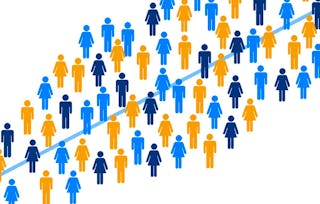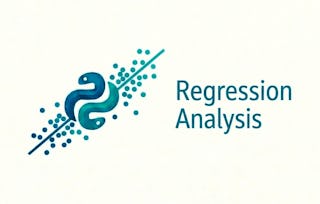This is the fourth course in the Google Advanced Data Analytics Certificate. Data professionals use regression analysis to discover the relationships between different variables in a dataset and identify key factors that affect business performance. In this course, you’ll practice modeling variable relationships. You'll learn about different methods of data modeling and how to use them to approach business problems. You’ll also explore methods such as linear regression, analysis of variance (ANOVA), and logistic regression.

Regression Analysis: Simplify Complex Data Relationships
Seize the savings! Get 40% off 3 months of Coursera Plus and full access to thousands of courses.

Regression Analysis: Simplify Complex Data Relationships
This course is part of Google Advanced Data Analytics Professional Certificate

Instructor: Google Career Certificates
69,618 already enrolled
Included with
588 reviews
What you'll learn
Investigate relationships in datasets
Identify regression model assumptions
Perform linear and logistic regression using Python
Practice model evaluation and interpretation
Skills you'll gain
Tools you'll learn
Details to know

Add to your LinkedIn profile
27 assignments
See how employees at top companies are mastering in-demand skills

Build your Data Analysis expertise
- Learn new concepts from industry experts
- Gain a foundational understanding of a subject or tool
- Develop job-relevant skills with hands-on projects
- Earn a shareable career certificate from Google

There are 6 modules in this course
You’ll begin by exploring the main steps for building regression models, from identifying your assumptions to interpreting your results. Next, you’ll explore the two main types of regression: linear and logistic. You’ll learn how data professionals use linear and logistic regression to approach different kinds of business problems.
What's included
8 videos3 readings4 assignments2 plugins
You’ll explore how to use models to describe complex data relationships. You’ll focus on relationships of correlation. Then, you’ll build a simple linear regression model in Python and interpret your results.
What's included
9 videos8 readings5 assignments5 ungraded labs
After simple regression, you’ll move on to a more complex regression model: multiple linear regression. You’ll consider how multiple regression builds on simple linear regression at every step of the modeling process. You’ll also get a preview of some key topics in machine learning: selection, overfitting, and the bias-variance tradeoff.
What's included
10 videos4 readings5 assignments3 ungraded labs2 plugins
You’ll build on your prior knowledge of hypothesis testing to explore two more statistical tests: Chi-squared and analysis of variance (ANOVA). You’ll learn how data professionals use these tests to analyze different types of data. Finally, you’ll conduct two kinds of Chi-squared tests, as well as one-way and two-way ANOVA tests.
What's included
9 videos3 readings4 assignments3 ungraded labs
You’ll investigate binomial logistic regression, a type of regression analysis that classifies data into two categories. You’ll learn how to build a binomial logistic regression model and how data professionals use this type of model to gain insights from their data.
What's included
8 videos4 readings5 assignments3 ungraded labs
You’ll complete an end-of-course project by building a regression model to analyze a workplace scenario dataset.
What's included
5 videos10 readings4 assignments6 ungraded labs
Earn a career certificate
Add this credential to your LinkedIn profile, resume, or CV. Share it on social media and in your performance review.
Instructor

Offered by
Explore more from Data Analysis
 Status: Free Trial
Status: Free Trial Status: Free Trial
Status: Free TrialJohns Hopkins University
 Status: Free Trial
Status: Free TrialUniversity of Colorado Boulder
 Status: Free Trial
Status: Free Trial
Why people choose Coursera for their career

Felipe M.

Jennifer J.

Larry W.

Chaitanya A.
Learner reviews
- 5 stars
81.97%
- 4 stars
10.03%
- 3 stars
4.25%
- 2 stars
1.70%
- 1 star
2.04%
Showing 3 of 588
Reviewed on Jan 7, 2025
Very informative, steady and understandable... Just wish I can remember all the points made
Reviewed on Apr 13, 2023
very good course, but this course is the most difficult for me
Reviewed on Apr 23, 2024
too good excellent don't hesitate to buy this course

Open new doors with Coursera Plus
Unlimited access to 10,000+ world-class courses, hands-on projects, and job-ready certificate programs - all included in your subscription
Advance your career with an online degree
Earn a degree from world-class universities - 100% online
Join over 3,400 global companies that choose Coursera for Business
Upskill your employees to excel in the digital economy
Frequently asked questions
Organizations of all types and sizes have business processes that generate massive volumes of data. Every moment, all sorts of information gets created by computers, the internet, phones, texts, streaming video, photographs, sensors, and much more. In the global digital landscape, data is increasingly imprecise, chaotic, and unstructured. As the speed and variety of data increases exponentially, organizations are struggling to keep pace.
Data science and advanced data analytics are part of a field of study that uses raw data to create new ways of modeling and understanding the unknown. To gain insights, businesses rely on data professionals to acquire, organize, and interpret data, which helps inform internal projects and processes. Data scientists and advanced data analysts rely on a combination of critical skills, including statistics, scientific methods, data analysis, and artificial intelligence.
A data professional is a term used to describe any individual who works with data and/or has data skills. At a minimum, a data professional is capable of exploring, cleaning, selecting, analyzing, and visualizing data. They may also be comfortable with writing code and have some familiarity with the techniques used by statisticians and machine learning engineers, including building models, developing algorithmic thinking, and building machine learning models.
Data professionals are responsible for collecting, analyzing, and interpreting large amounts of data within a variety of different organizations. The role of a data professional is defined differently across companies. Generally speaking, data professionals possess technical and strategic capabilities that require more advanced analytical skills such as data manipulation, experimental design, predictive modeling, and machine learning. They perform a variety of tasks related to gathering, structuring, interpreting, monitoring, and reporting data in accessible formats, enabling stakeholders to understand and use data effectively. Ultimately, the work of data professionals helps organizations make informed, ethical decisions.
Large volumes of data — and the technology needed to manage and analyze it — are becoming increasingly accessible. Because of this, there has been a surge in career opportunities for people who can tell stories using data, such as senior data analysts and data scientists. These professionals collect, analyze, and interpret large amounts of data within a variety of different organizations. Their responsibilities require advanced analytical skills such as data manipulation, experimental design, predictive modeling, and machine learning.
More questions
Financial aid available,

